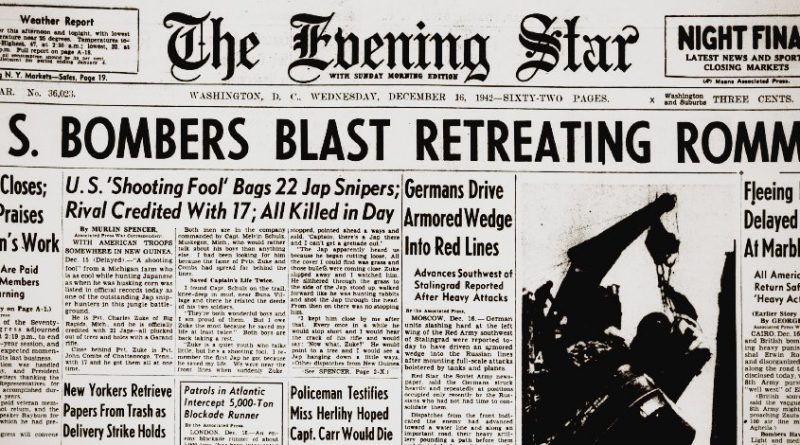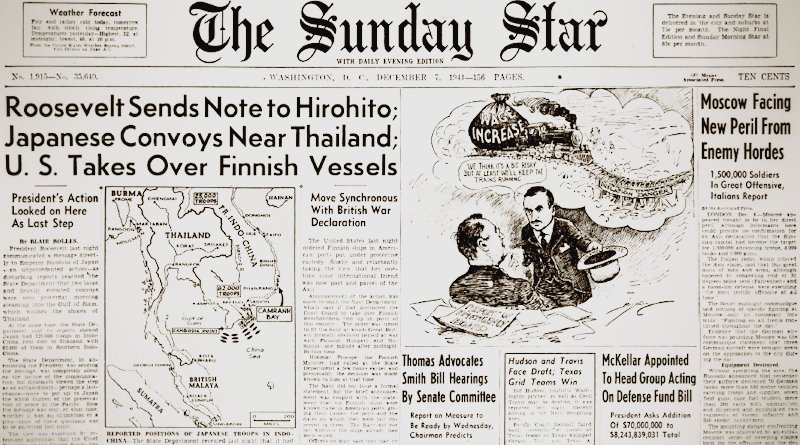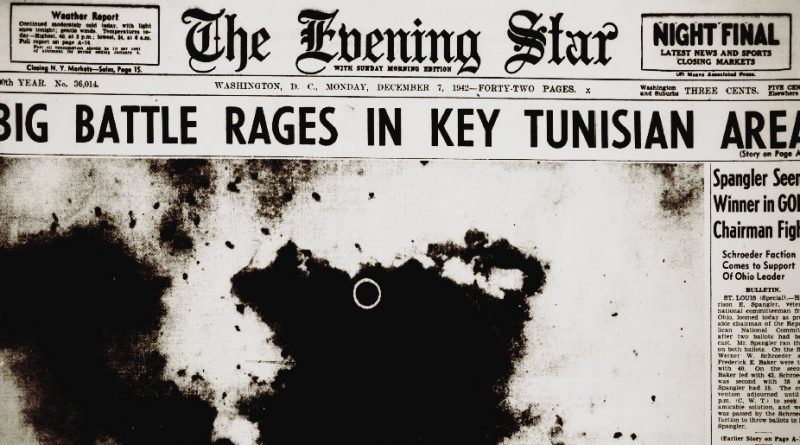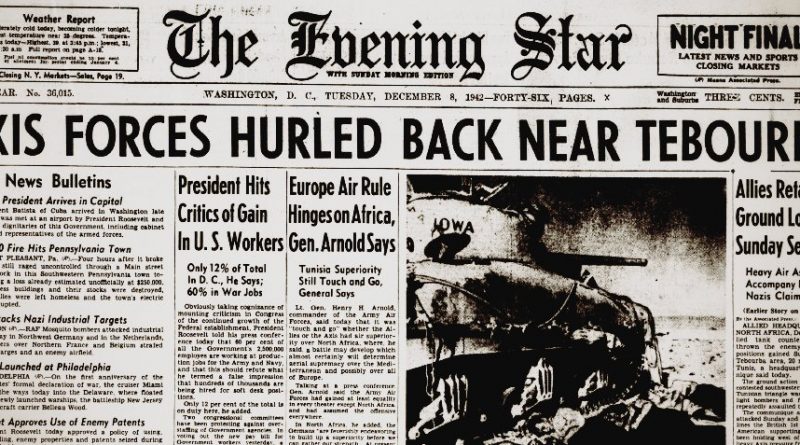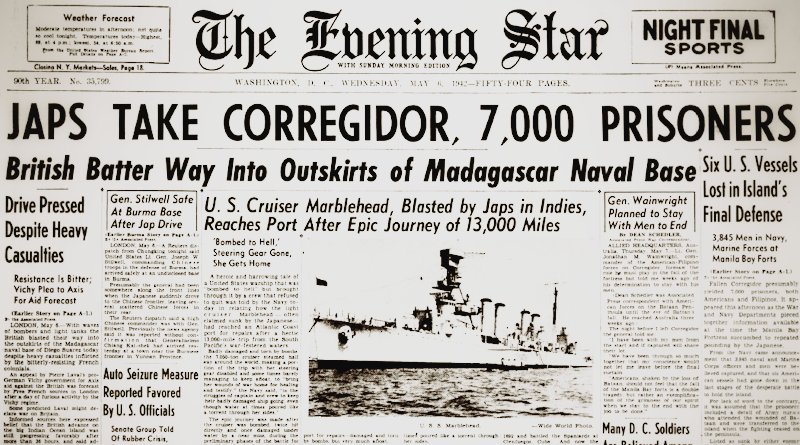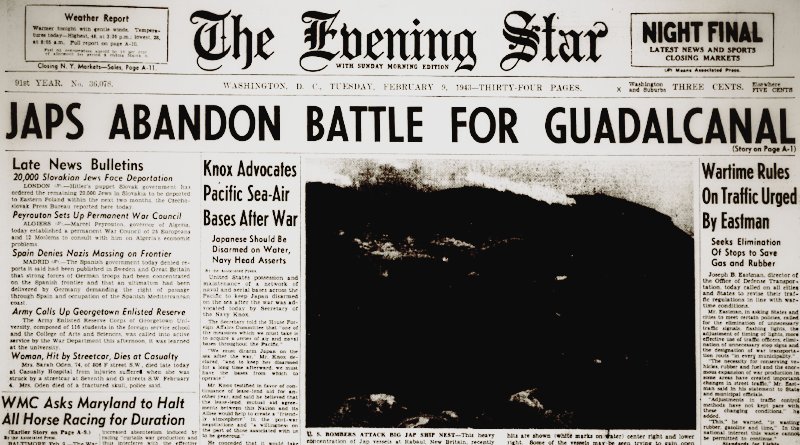World War II Chronicle: December 16, 1942
Click here for TODAY’S NEWSPAPER
Today we learn that the B-17 that carried famed World War I ace Eddie Rickenbacker across the Pacific was riddled with shrapnel and over 100 bullet holes from the Japanese attack on Oahu (page two). Bomber damage like this was routinely patched up and major sections from crippled planes would be salvaged for still-flyable aircraft so that would not have been a factor in the loss. It seems that a rough aborted takeoff may have knocked the navigator’s octant off a bit. When you are flying across the Pacific, the slightest error can cause you to miss your destination by many miles, which is likely what happened to the plane carrying Rickenbacker…
Sports section begins on page 56
Roving Reporter by Ernie Pyle
WITH THE AMERICAN FORCES IN ALGERIA — (By Wireless) — Our troops are finding the African climate a welcome change, most of the time, from the wet bitterness of England.
The North African winter at this time of year is rather spotty. It has been nice most of the time since we came, but when it isn’t nice it sure is terrible.
We are now in the first month of their winter season. From now till late March there are few mosquitoes, and there isn’t much danger of malaria. The hospitals report only an occasional case.
On the average the nights are quite chilly. It starts getting cold as soon as the sun gets low, around 4 o’clock. By dark it is usually cold enough for an over coat. You sleep under all the blankets you can get.
In the morning the sun isn’t well up until after 6. Usually the sky is a clear blue before noon. It seems to be a larger sky than ours back home. Maybe that’s because we are out where we can see more sky than ordinarily. Some days high white clouds cover the sky. Some days go by entirely cloudless, and then the sun is quite warm and it is really like a day in late June at home.
The troops go around most days stripped to the waist, and practically everyone is getting a sun tan. But nobody wears a sun helmet now.
Once a week or so comes a bad spell. The last one was thoroughly miserable. For two days it poured rain, and there was a cold and bitter wind. It was exactly like a bad winter day in England.
Our troops are living mostly in fields. Many company commanders march their men up and down just to keep them warm. I felt sure that half of them would be sick, but there was no such reaction at all. Doctors say the constant living outdoors, even in the bad weather, is healthier than living inside. Also our troops are getting pretty tough now.
Most of the men have abandoned their heavy underwear, but they’re not wearing summer uniforms and won’t till next spring.
They live pretty primitively in their scattered camps. They’re on American rations now and the food is really wonderful. But there is very little water. At some camps a man ordinarily gets a gallon a day for drinking, shaving and washing his clothes. But at many camps it’s as little as a quart.
During a cold spell the men fill their mattress covers with straw, put down one blanket to lie on and have five spread over them. There is just room in each tent for two men and the two usually sleep together so they can pile both men’s blankets across them.
There is no room for little niceties and homey touches as in the bigger tents in England. And there are no lights. But two boys did rig up an Eskimo lamp. They brought some liquid paraffin in a nearby town, poured it into an empty can, then cut a few inches off one man’s waist belt (which was too big for him) and shoved this through the top of the can for a wick. It really made a serviceable light
Military police patrol the streets in the cities. Usually it is quiet as the grave by 1030. The local people are terrified of air raids and won’t venture out at night. Their fear is so intense I think Germany must have done an extra propaganda job of scaring them before we came.
We Americans actually know less about what is happening throughout North Africa than you do at home. We get the communiques here daily in the French papers, but there aren’t many details, and anyway most of us can’t read French well enough to get the fine points.
Some listen to the 9 o’clock news from BBC in London and a few camps have short-wave radios and get hourly news from America. It seems ironic that what happens 200 miles from us must be flashed to America and then back here again before we can hear it. But that’s the way things are in this crazy world.
Evening star. (Washington, D.C.), 16 December 1942. Chronicling America: Historic American Newspapers. Lib. of Congress.
https://chroniclingamerica.loc.gov/lccn/sn83045462/1942-12-16/ed-1/
